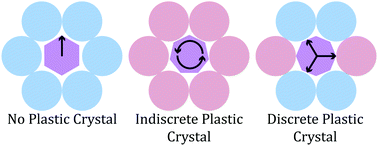Symmetries in hard polygon systems determine plastic colloidal crystal mesophases in two dimensions
Abstract
Orientational ordering is a necessary step in the crystallization of molecules and anisotropic colloids. Plastic crystals, which are possible mesophases between the fluid and fully ordered crystal, are translationally ordered but exhibit no long range orientational order. Here, we study the two-dimensional phase behavior of hard regular polygons with edge number n = 3–12. This family of particles provides a model system to isolate the effect of shape and symmetry on the existence of plastic crystal phases. We show that the symmetry group of the particle, G, and the symmetry group of the local environment in the crystal, H, together determine plastic colloidal crystal phase behavior in two dimensions. If G contains completely the symmetry elements of H, then a plastic crystal phase is absent. If G and H share some but not all nontrivial symmetry elements, then a plastic crystal phase exists with preferred particle orientations that recover the absent symmetry elements of the crystal; we call this phase the discrete plastic crystal phase. If G and H share no nontrivial symmetry elements, then a plastic crystal phase exists without preferred orientations, which we call an indiscrete plastic crystal.



 Please wait while we load your content...
Please wait while we load your content...